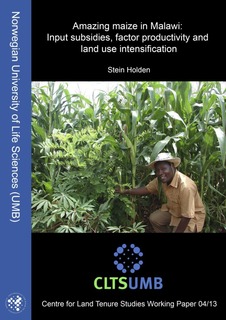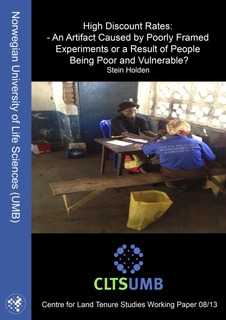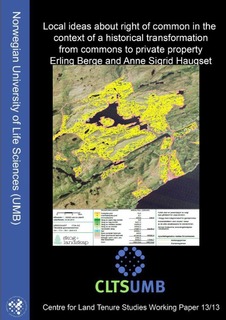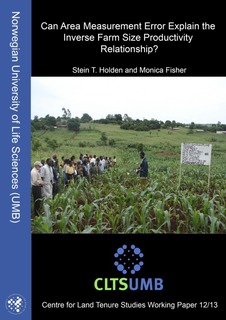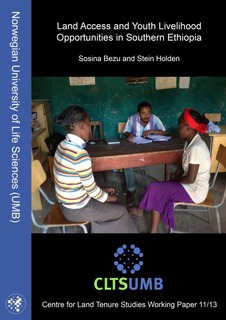Location
The Centre for Land Tenure Studies was opened at the Nowegian University of Life Sciences (NMBU) on the 27th of June 2011 resulting from a joint initiative by researchers at the Department of International Environment and Development (Noragric), the School of Economics and Business, and the Department of Landscape Architecture and Spatial Planning. In 2012 was joined by the Department of Ecology and Natural Resource Management.
Mission
The Centre for Land Tenure Studies (CLTS) at NMBU is established to further the study of land tenure. Land tenure studies define a broad and complex field of study cutting across many disciplines. For CLTS this entails, but is not limited to, the following activities:
- Provide a common arena for discussing land tenure issues, including a series of seminars directed to present new research or important theoretical perspectives. This may be designed as part of an educational program.
- Promulgate a joint series of working papers.
- Support international publication of articles and books.
- Develop and conduct joint courses at both Master and PhD level.
- Initiate and support exchange of researchers.
- Participate in research networks related to land tenure.
- Maintain a public list of collaborating institutions and researchers.
- Initiate and develop applications for research funds to support basic research on land tenure both by our own efforts and in collaboration with other research groups working on land tenure questions.
In its activities the centre will use English as its working language as far as practically possible. In short we may say that the mission of the Centre for Land Tenure studies is to enhance collaboration across departments at NMBU; to strengthen the visibility of NMBU activities within the field of land tenure; to strengthen NMBU’s international collaboration and networks within the field; to contribute to research and knowledge generation on land tenure issues; to help build capacity in the South and in Norway within the field; to disseminate policy lessons, and to contribute to policy debates.
Resources
Displaying 51 - 55 of 67Amazing maize in Malawi : input subsidies, factor productivity and land use intensification
The paper uses three years of household farm plot panel data (2006-2009), covering six districts in central and southern Malawi to assess factor productivity and farming system development under the input subsidy program. All farm plots of the households were measured with GPS. Maize production intensified in this period as maize area shares of the total farm size were reduced while input use intensity and yields increased. Yields of improved maize were significantly (+323 kg/ha) higher than for local maize.
High discount rates : an artifact caused by poorly framed experiments or a result of people being poor and vulnerable?
This study revisits the issue whether poverty and shocks are associated with high discount rates by using an incentive compatible Multiple Price List approach in a poor rural population in Africa where a substantial share of the population had been affected by drought in the recent rainy season. Randomized treatments included tests for present bias, magnitude effects and time horizon effects.
Local ideas about rights of common in the context of a historical transformation from commons to private property
Paper presented at the 14th global conference of the International Association for the Study of Commons, Mt Fuji, June 3- June 7, 2013
Can area measurement error explain the inverse farm size productivity relationship?
The existence of an inverse relationship (IR) between farm size and productivity in tropical agriculture remains a debated issue with policy relevance. Poor agricultural statistical data, including data on farm sizes and farm plot sizes that typically are self-reported by farmers, can lead to biased results and wrong policy conclusions. This study combines self-reported and GPSmeasured farm plot and farm sizes to assess how measurement error affects the IR using three rounds of farm plot and household data from Malawi.
Land access and youth livelihood opportunities in Southern Ethiopia
Ethiopia. Access to agricultural land is a constitutional right for rural residents of Ethiopia. We used survey data from the relatively land abundant districts of Oromia Region and from the land scarce districts of Southern Nations, Nationalities and Peoples’ (SNNP) Region. We found that youth in the rural south have limited potential to obtain agricultural land that can be a basis for viable livelihood. The law prohibits the purchase and sale of land in Ethiopia.








